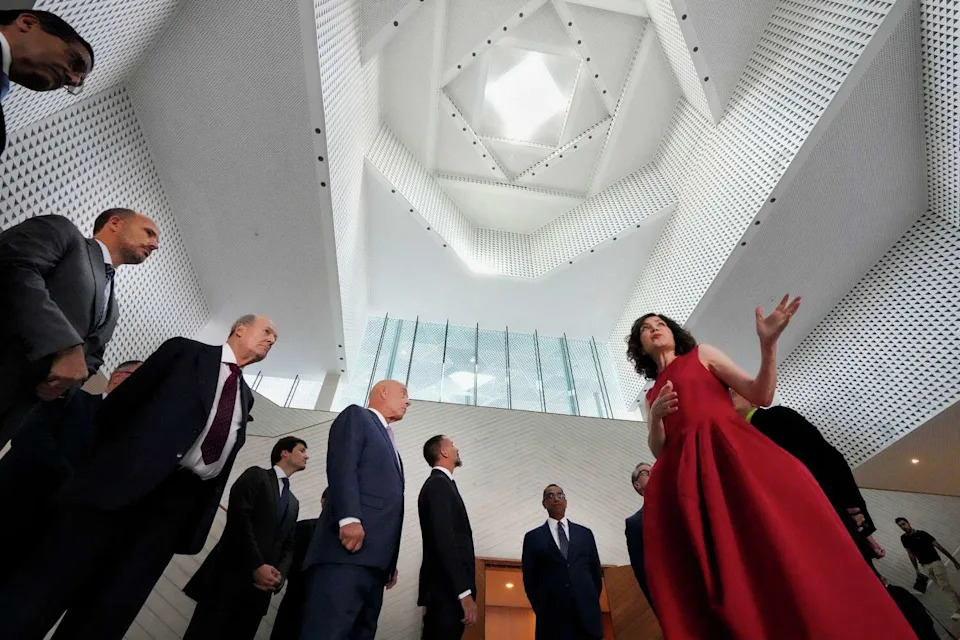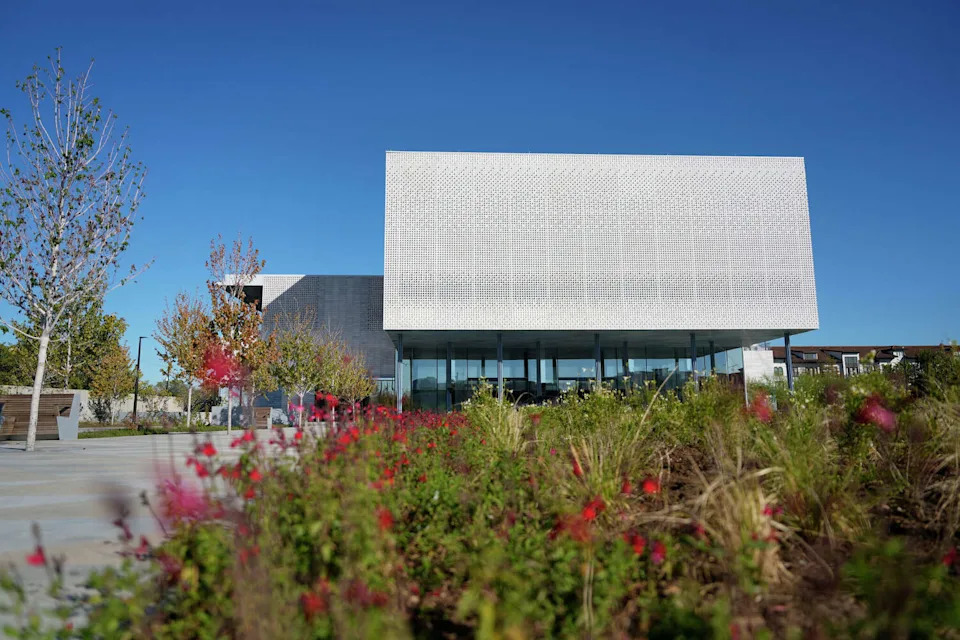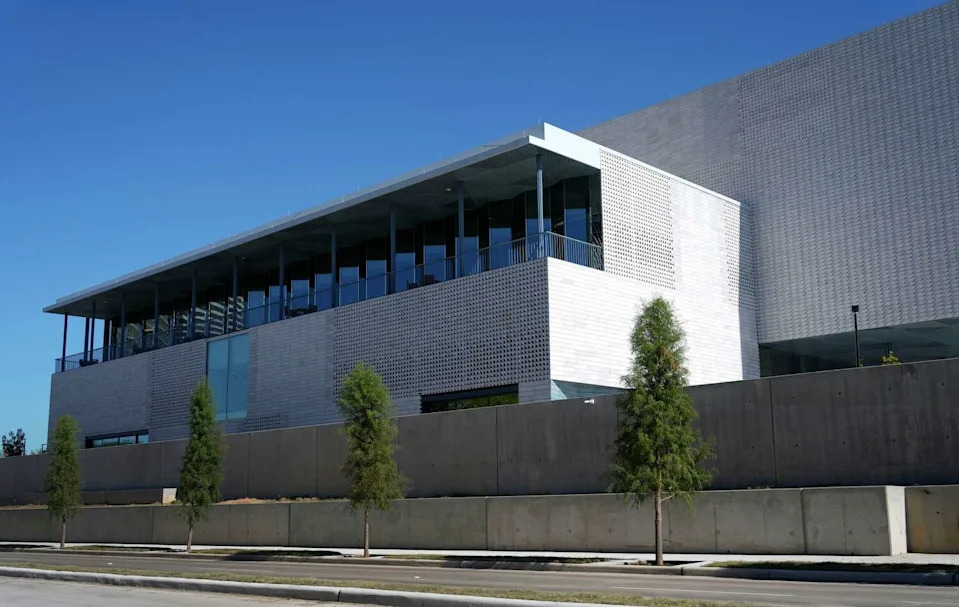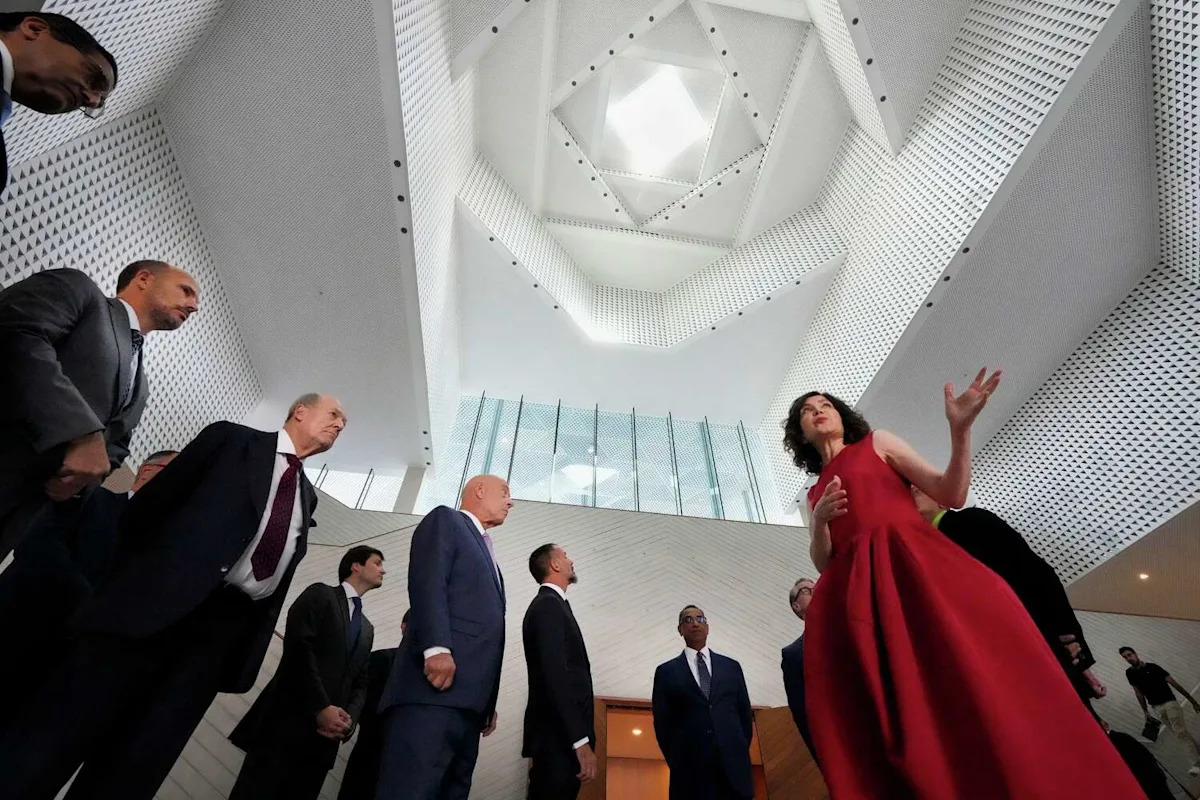After nearly two decades of planning and construction, a vacant property near Buffalo Bayou has been transformed into a majestic, 150,000-square-foot Ismaili Center – a new cultural and religious landmark that is the first of its kind in the United States.
While the Ismaili Center, Houston will serve as a prayer venue, its representatives hope locals also embrace it as a peer to the likes of the Menil Collection, Rothko Chapel, Asia Society Texas, and the Museum of Fine Arts, Houston. The center plans to host art exhibitions, lectures and music recitals.
The center opened its doors Thursday morning in a grand ceremony, welcoming 500 guests and civic leaders.
“We’re here to recognize the Ismaili community’s greatness, and in doing so, we get to show the greatness of the city of Houston,” Mayor John Whitmire told the audience in a speech that praised the city’s diversity.
“This is a historic event,” Whitmire added. “Pause a moment and realize what we’re experiencing, what we’re witnessing.”

Architect Farshid Moussavi, right, gives a tour to Mayor John Whitmire and His Highness Prince Rahim Aga Khan V during the dedication ceremony for Ismaili Center, Houston, the first in the U.S. and the seventh worldwide, in Houston, Thursday, Nov. 6, 2025. The dedication ceremony comes nearly two decades after Houston was selected as the home of the nation’s first Ismaili civic and cultural complex. (Brett Coomer/Houston Chronicle)
What are Ismaili centers?
Ismailis belong to a branch of Shia Muslims who trace their faith to their belief in the hereditary Imam. An estimated 35,000 to 40,000 Ismailis live in Greater Houston.
They believe the Imams they follow are spiritual guides descended from the Prophet Muhammad, said Georgetown University associate professor Shenila Khoja-Moolji.
The current Imam, Aga Khan V, is the 50th descendant in that lineage. Aga Khan V is the son and successor of the Ismaili Center’s initial visionary: His Highness Prince Karim Al-Hussaini, or the Aga Khan IV.
Though the land had been purchased years earlier, the center was officially confirmed in 2018. As the project neared completion, Aga Khan IV died in February. One of the center’s closest local collaborators, former Houston Mayor Sylvester Turner, passed away about a month later.

The Ismaili Center is shown in Houston Wednesday, Nov. 5, 2025. (Melissa Phillip/Houston Chronicle)
On Thursday, Aga Khan V ushered in his father’s dream with an official dedication ceremony at the center located on Allen Parkway and Montrose Boulevard. It’s the seventh Ismaili center in the world, and the first to be built in the U.S.
As the ceremony unfolded Thursday morning, dignitaries sat in silence and watched a live video feed of Aga Khan V’s motorcade arriving to the center’s well-manicured grounds. An announcer asked attendees to rise as the spiritual leader walked into an event center with Whitmire.
After the mayor’s speech, Aga Khan V addressed the crowd and said the mayor was “a tough act to follow.”
“I’ll start by saying that Houston is the friendliest city I’ve ever visited,” Aga Khan V said, sparking applause and laughter.
He said Houston was a “natural choice” for the first Ismaili center in the U.S. – the city is home to a significant number of Ismailis, he said, and Houston offers “friendship to people from all over the world.”
“This building may be called an Ismaili Center, but it is not here for Ismailis only,” he said. “It is for all Houstonians to use, a place open to all who seek knowledge, reflection and dialogue.”
Designed and built by award-winning architects, engineers and contractors, the center features sweeping verandas and nine acres of gardens. The project was an effort by Farshid Moussavi, Nelson Byrd Woltz Landscape Architects, AKT II, DLR Group and McCarthy Building Companies.
The center’s representatives declined to share the total cost of the project, but a 2021 filing with the Texas Department of Licensing and Regulation estimated the center cost $176.2 million. The property is owned by the Aga Khan Foundation USA.

The Ismaili Center is shown from Montrose Blvd. in Houston Wednesday, Nov. 5, 2025. (Melissa Phillip/Houston Chronicle)
‘This building is about heritage’
Outside the building, the American, Texas and Ismaili flags fly next to one another. The intent is to show the center’s embrace of tradition, and respect for the state it’s built in.
“This building is about heritage. It’s about saying the Ismaili community has a past, but it’s not stuck in the past,” said architect Farshid Moussavi. “It’s also a living community.”
The center is equipped with an exhibition gallery, theater, banquet halls, educational spaces, a café and a prayer hall. Creative works are displayed throughout the space, with an inaugural exhibition by artist Raheleh Filsoofi and musician Reza Filsoofi that aims to create a multi-sensory experience through touch and sound.
Natural light is incorporated throughout the center, including in the five-story central atrium. With an entry foyer and cascading grand staircase, the daylight is meant to be used as a guide for movement.
The building’s verandas are supported by 49 star-shaped steel columns, honoring Aga Khan IV, the 49th Imam. Those columns are among the recurring blue hues at the center, which is a nod to traditional Persian architecture.
The 12,240-square-foot prayer hall is designed for peace. Light-colored wood panels perforated with Kufic calligraphy are a key decorative portion of the space, and important names for Ismailis – “Allah,” “Muhammad” and “Ali” – are depicted.
Muslims generally pray facing the Kaaba, a sacred mosque in the Saudi Arabian city Mecca. That direction is known as the “Qibla.” While facing the Qibla isn’t a requirement for Ismailis, the center was constructed with it in mind anyway.
‘A moment of great rejoicing’
To Khoja-Moolji and other members of the religion, Aga Khan IV was the only Ismaili Imam they had ever known. The grief of his loss, however, has changed to a deepening love for his son and successor, and she believes Aga Khan V’s visit to the center in Houston “is a moment of great rejoicing for the community.”
The role the Aga Khan plays as the spiritual leader for Ismailis is unique to the group, said New York-based scholar Hussein Rashid. He said Ismailis gather in an audience with the Aga Khan to receive blessings and guidance.
“A lot of people are very curious about this because they don’t see this happening with very many other Muslim communities in the context of the United States,” Rashid said. “And so there are a lot of questions around this, but it’s a very important practice and event in the life of a believer.”
The inauguration of Houston’s Ismaili Center is one of the stops Aga Khan V is making on his visits to the southwestern and central parts of the U.S. During his visit, he asked that only people who already live in the regions he is visiting show up to meet him.
“To be able to focus his attention on the Jamat in these parts of the jurisdiction, Hazar Imam does not wish members of the Jamat from other parts of the United States or other countries to travel to these regions during the visit,” read the announcement of his visit. The “Jamat” refers to the community and “Hazar Imam” is another name for the Aga Khan.
Beauty and spirituality
When Aga Khan V landed in the Houston area, he received a key to Sugar Land from its mayor, Carol McCutcheon, and watched a youth musical ensemble. He later went to Houston City Hall to meet Whitmire, who presented him another key to the city.
Rashid, who is an Ismaili Muslim, said beauty and spirituality are linked within the faith. That’s seen in the new center, he says.
“Anybody can look at it and admire it, and hopefully it invites people to think about their role in the world,” Rashid said. “I think good art does that and invites people to think about their place in the world. And I think architecture is really the most public and popular art we have in this country.”
Shaukat Maredia has been leading one of Houston’s busiest eateries, Aga’s Restaurant and Catering, since 2010. As an Ismaili himself, he has visited the center starting from its early stages and said people are reaching out from across the world to learn how they can visit.
Maredia said his restaurant will prepare food for 25,000 people, free of charge, for an exclusive event at NRG Park with the Aga Khan V on Friday.
“Aga’s is not only for the Muslim community, however, it’s tailored around the Muslim community,” Maredia said. “Any religious celebrations, any religious holidays, any nonprofit organizations, mosques – they’re important to Aga’s. We want to support the organizations, the mosques, the people of Houston.”
A cultural center
Ismaili Center spokesperson Omar Samji said the prayer hall accounts for around 8% of the building. He said while some other large places of worship are primarily congregation spaces, the Ismaili Center includes rooms for theater, education, conferences and art exhibitions.
Moussavi, whose firm was handpicked for the project by Aga Khan IV after winning an international competition in 2019, said the center goes beyond faith.
“It’s a cultural center. That’s how we should talk about it,” Moussavi said. “You wouldn’t go to the Museum of Fine Arts (where) its patrons may have been Christians, and call it a church, right?”
When a Jamatkhana, or prayer center for Ismailis, opened in Cedar Park in 2018, Gov. Greg Abbott delivered the keynote speech. He thanked the 2,500 Ismaili volunteers who dedicated more than 13,000 hours to the evacuation and recovery efforts in the aftermath of Hurricane Harvey, according to the official Ismaili community site.
He wasn’t present at Thursday’s ceremony.
“It’s been a very enjoyable collaborative relationship with mayors that have really been champions of it,” Samji said. “At the state level, it’s a little more of a concept.”
As state leaders like Abbott have spoken out against “Sharia law,” Samji said he believes much of the pushback on the Muslim world comes from a place of misunderstanding the diversity of the faith.
“It gets painted with a very broad brush, and I think we would notice right away if we were doing that with other faith groups,” he said. “If you painted all of Protestant Christianity with one brush, it would be pretty well understood by everybody that that’s not representational.”
This article originally published at Houston’s stunning new Ismaili Center, the first of its kind in the U.S., is finally open. See inside..

